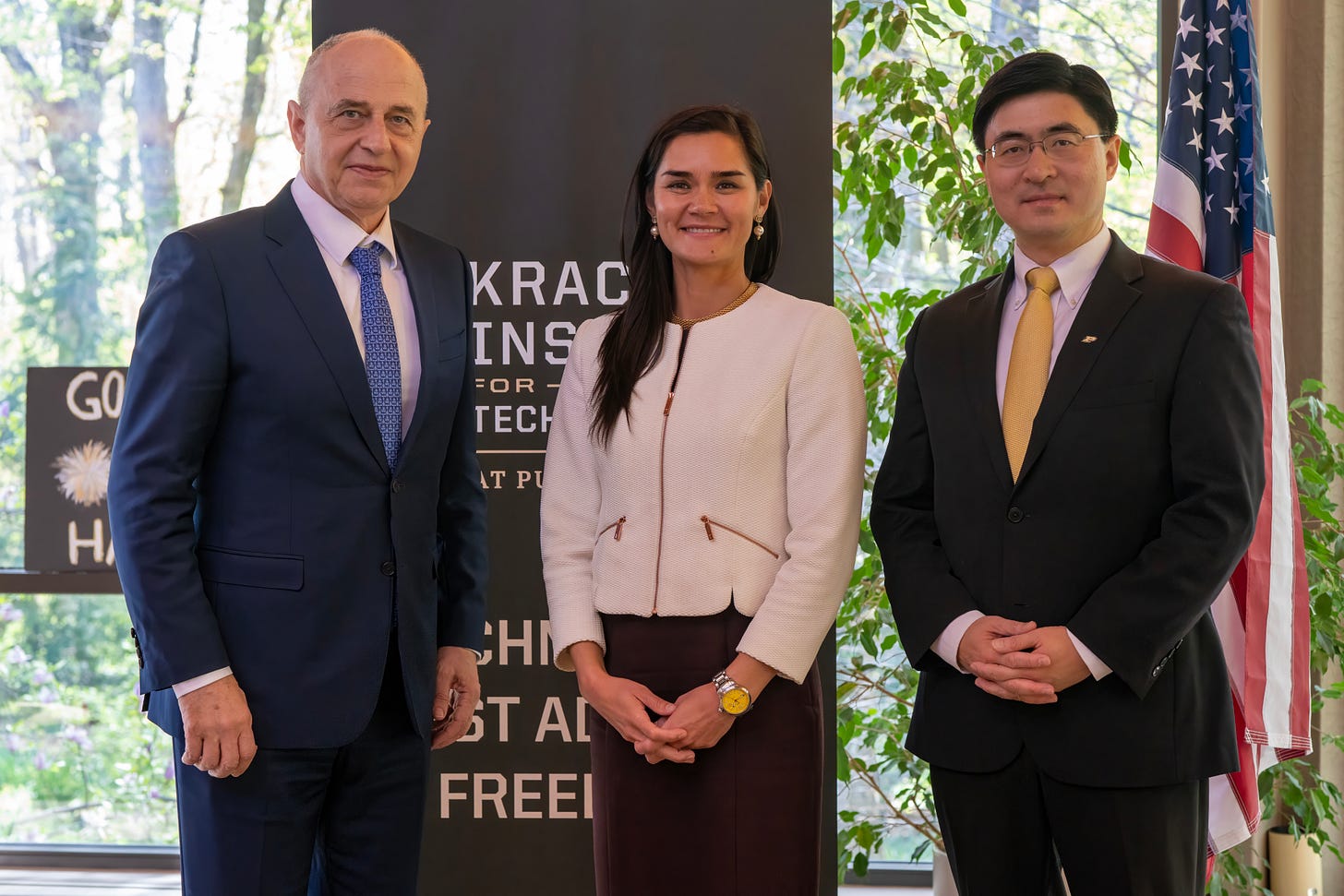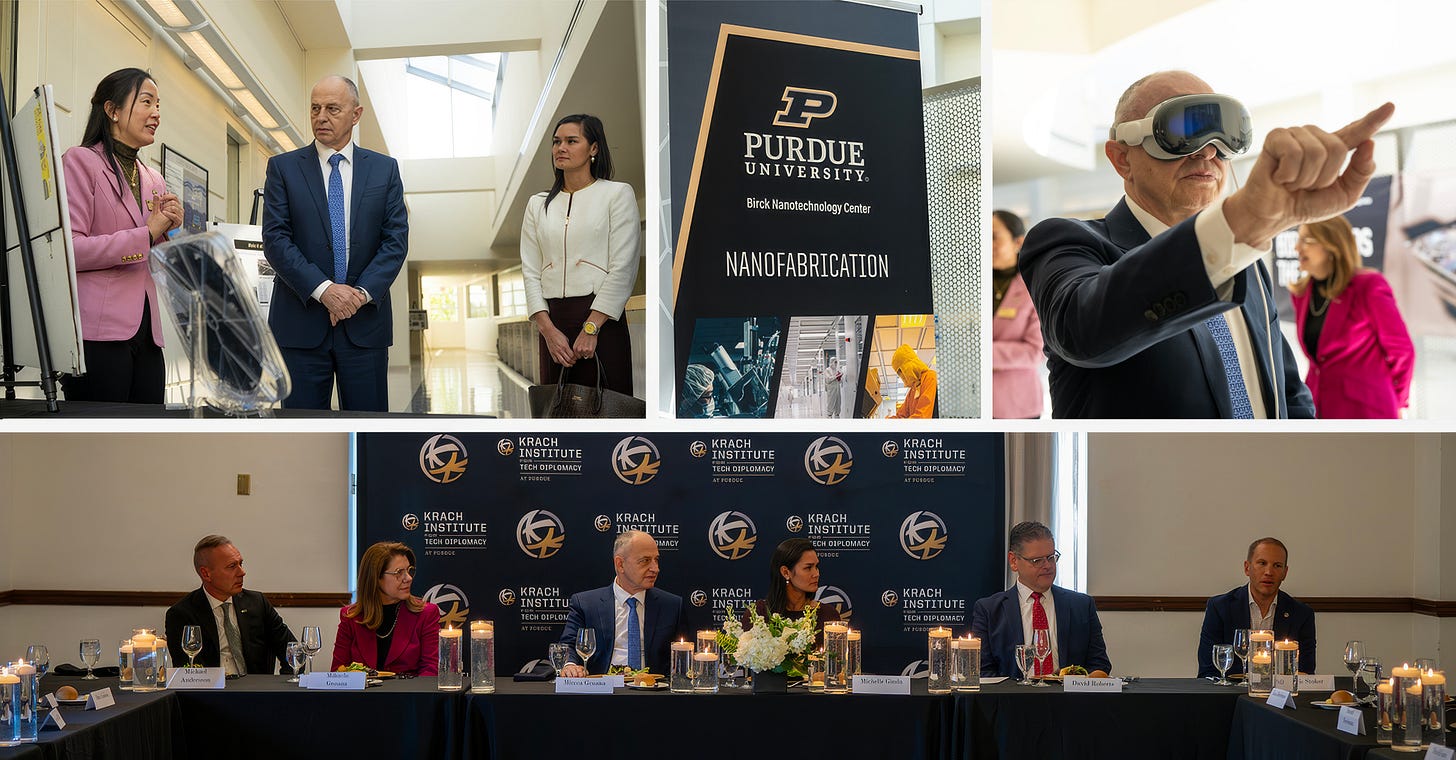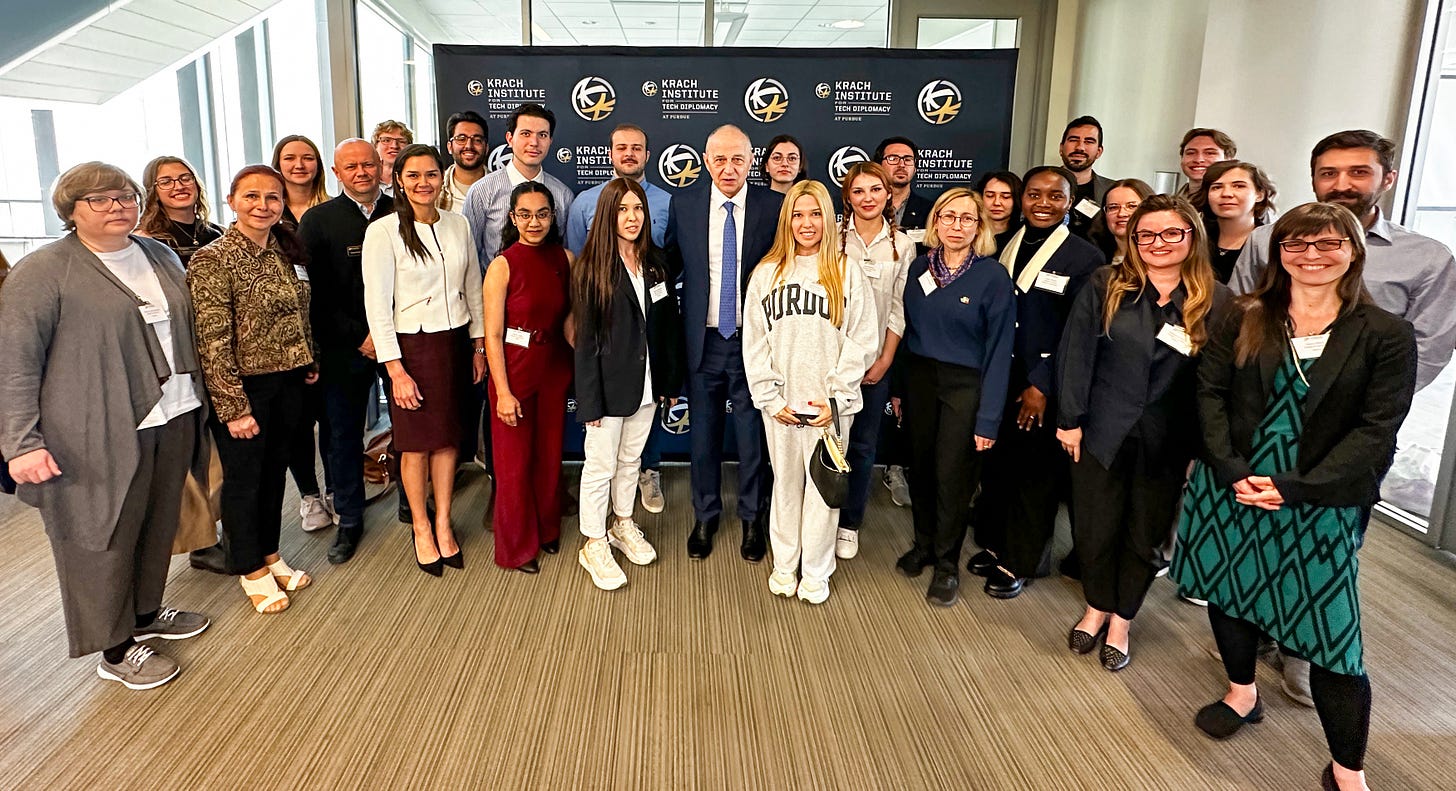Tech Diplomacy Now: Krach Institute Expands Ties with NATO
“Today, the stakes could not be higher. At the Krach Institute, we are proud to work together with NATO to ensure that technology fuels a new era of collective security, freedom and prosperity.”
TABLE OF CONTENTS
Top News of the Week
Announcements
Latest News
Technology Strategy and Policy
Artificial Intelligence
Telecommunications Networks and Infrastructure
Critical Minerals
Synthetic Biology
Quantum
Advanced Aerospace Technology
Semiconductors and Microelectronics
Energy and Climate
Opinion and Commentary
The Last Word
Top News of the Week – Europeans arrest more Chinese spies
On Monday, Germany and the UK arrested five individuals accused of spying on behalf of the PRC Ministry for State Security. In the German case, the individuals who appear to be German citizens are accused of stealing advanced technology for the PRC using a front organization posing as a technology research firm. This comes just days after German Chancellor Olaf Scholz conducted a state visit to Beijing to meet with PRC leader Xi Jinping.
Key Takeaways:
The three Germans are accused of stealing technology for advanced military ship engines that could be used to modernize the PLA Navy.
The German Interior Minister, Nancy Faeser, stated that these technologies were “particularly sensitive” and that PRC espionage posed a significant threat to German business, industry, and science.
The German Justice Minister said: "At the time of their arrest, the accused were in further negotiations about research projects that could be particularly useful for expanding China's maritime combat power."
The two accused in the UK case involve British citizens who were working as parliamentary researchers, the details of their crimes was first released last year.
In reference to both the German and UK charges, the PRC responded with vehement denials claiming that these are simply political manipulations to smear China.
More Background:
Germany arrests three on suspicion of spying for China, as Britain charges two – SCMP, April 23, 2024
Germany arrests 3 suspected China spies – DW, April 22, 2024
UK police charge two men with spying for China – Reuters, April 22, 2024
Ex-Google engineer charged with AI tech theft for Chinese firms – The Business Times, March 7, 2024
Five Eyes intelligence chiefs warn on China's 'theft' of intellectual property – Reuters, October 19, 2023
Krach Institute for Tech Diplomacy at Purdue Expands Ties with NATO
The Krach Institute for Tech Diplomacy at Purdue (KITDP) was honored to welcome NATO Deputy Secretary General Mircea Geoană on April 25, 2024. The visit to the Institute’s headquarters at Purdue University underscored a shared commitment to leveraging innovation and technology for the defense and security needs of both the United States and the Alliance.

“We are grateful to Deputy Secretary General Mircea Geoană for visiting the Krach Institute for Tech Diplomacy at Purdue and his steadfast commitment to advancing trusted technology. His leadership on initiatives such as the Clean Network have been instrumental in securing high tech across the Alliance from authoritarian threats” said Michelle Giuda, CEO of the Krach Institute for Tech Diplomacy at Purdue. “Today, the stakes could not be higher. At the Krach Institute, we are proud to work together with NATO to ensure that technology fuels a new era of collective security, freedom and prosperity.”
Technology is changing our societies, but it is also changing security and warfare. To maintain our technological edge, we need to innovate and adapt faster than our adversaries across all EDTs. And we need to make better use of our academia powerhouse. This is why I am at Purdue University today,” said NATO Deputy Secretary General Mircea Geoană. “We will continue to explore opportunities to collaborate in order to accelerate the secure and trusted adoption of dual use technologies.”
Purdue University, and like-minded partners across Indiana’s “Hard Tech Corridor” of the United States, such as the Applied Research Institute (ARI), to ensure the U.S. and the Alliance maintain a technological edge.
Both NATO and the Krach Institute will seek to expand existing cooperation in the responsible innovation and adoption of critical and emerging technologies, work together to establish international standards for trusted technology, and encourage the exchange of teaching, leadership, and research experiences between the Krach Institute, NATO, its members and partners.
Latest News
House passes $60.8B in delayed Ukraine aid – Politico, April 20, 2024
Apple Says It Was Ordered to Pull WhatsApp from China App Store – NYTs, April 18, 2024
Congress Fast-Tracks TikTok Ban Legislation, Setting Up Possible Passage This Month – WSJ, April 18, 2024
How an Obscure Chinese Real Estate Start-Up Paved the Way to TikTok – NYTs, April 18, 2024
Malicious cyber activity spiking in Philippines, analysts say – The Record, April 17, 2024
House panel says China subsidizes fentanyl production to fuel crisis in the United States – Associated Press, April 16, 2024
France is ‘overwhelmed with propaganda,’ minister says – Politico, April 16, 2024
Technology Strategy and Policy
Chinese Exports Are Threatening Biden’s Industrial Agenda – NYTs, April 18, 2024
NATO to launch new cyber center to contest cyberspace 'at all times' – The Record, April 18, 2024
Germany, China sign joint declaration on car data sharing – Reuters, April 17, 2024
This senator wants an online privacy law. She’s slowed efforts for years. – Washington Post, April 13, 2024
US Treasury’s Sanctions Office Probes Companies Over Chips in Russia’s War – Bloomberg, April 12, 2024
Artificial Intelligence
Lenovo and Alibaba team up to build AI computers, as generative AI race heats up in China – SCMP, April 19, 2024
Deepfakes, distrust and disinformation: Welcome to the AI election – Politico, April 16, 2024
UK Starts Drafting AI Regulations for Most Powerful Models – Bloomberg, April 15, 2024
A.I. Has a Measurement Problem – NYTs, April 15, 2024
Huawei says it will start selling PCs powered by Intel's AI chip – Nikkei Asia, April 15, 2024
Telecommunications Networks and Infrastructure
Apple pulls WhatsApp, Threads from China app store on Beijing's order – Nikkei Asia, April 19, 2024
Apple plans to invest more than $250m to expand Singapore campus – Nikkei Asia, April 18, 2024
The invisible seafaring industry that keeps the internet afloat – The Verge, April 16, 2024
If Apple declines, the West declines – The Spectator, April 16, 2024
Chinese-Linked LightSpy iOS Spyware Targets South Asian iPhone Users – The Hacker News, April 15, 2024
China's attacks on U.S. infrastructure aren't going anywhere – Axios, April 14, 2024
Digesting the 2023 World Radiocommunication Conference’s outcomes and implications for US-China 5G competition – Atlantic Council, April 12, 2024
Better broadband on the way for the Northern Marianas – RNZ, April 12, 2024
Critical Minerals
Reclaiming leadership: Australia and the global critical minerals race – ASPI, April 17, 2024
Fault Lines – C4ADS, April 17, 2024
Southeast Asia’s potential in critical minerals – The Diplomat, April 15, 2024
China accuses West of targeting its rare earths and food technology – The Telegraph, April 15, 2024
Battery materials plant opens in Oklahoma – Recycling Today, April 11, 2024
Synthetic Biology
China's drugmakers can't sell mRNA shots but haven't quit yet – Reuters, April 19, 2024
Chinese Company Under Congressional Scrutiny Makes Key U.S. Drugs – NYTs, April 15, 2024
Two Brothers, a Big Biotech Bet and an $8 Billion Payout – WSJ, April 13, 2024
Quantum
Nvidia to help Japan build hybrid quantum-supercomputer – Nikkei Asia, April 21, 2024
Quantum Computing—The Future Is Here – INSS, April 15, 2024
Scientists install encryption shield to protect advanced Chinese quantum computer from attack – SCMP, April 12, 2024
Getting hands-on with quantum – Politico, April 4, 2024
Advanced Aerospace Technology
Myanmar general killed in drone attack near Thai border – Jakarta post, April 22, 2024
Russia Oil Refining Curbed by Flood as Drone Damage Persists – Bloomberg, April 22, 2024
Drone delivery service launches in China’s Greater Bay Area, slashing transport time and costs between cities – SCMP, April 16, 2024
Semiconductors and Microelectronics
Huawei starts sales of new Pura 70 smartphone to crowds amid chip scrutiny – Reuters, April 18, 2024
Onshoring Semiconductor Production: National Security Versus Economic Efficiency – CFR, April 17, 2024
G42 Made Secret Pact with US to Divest from China Before Microsoft Deal – Bloomberg, April 16, 2024
Who will replace Intel and AMD in China's networks? – Light Reading, April 15, 2024
Energy and Climate
Sam Altman Invests in Energy Startup Focused on AI Data Centers – WSJ, April 22, 2024
Tesla Co-Founder JB Straubel Built an EV Battery Colossus to Rival China – Bloomberg, April 18, 2024
EU-China rift deepens as Vestager launches clean tech subsidy investigation – Euractiv, April 15, 2024
Electric cars could be hijacked by hostile states like China to gather intelligence, minister warns – The Mirror, April 15, 2024
US senator wants to put the brakes on Chinese EVs – The Register, April 15, 2024
Opinion and Commentary
China's technological development has run out of steam – Nina Xiang, Nikkei Asia, April 19, 2024
Forget About Chips—China Is Coming for Ships – Agathe Demarais, Foreign Policy, April 19, 2024
China, Russia and Iran Are Reviving the Age of Empires – Hal Brands, Bloomberg, April 14, 2024
America is the undisputed world leader in quantum computing even though China spends 8x more on the technology–but an own goal could soon erode U.S. dominance – Jungang Kim and Christopher Monroe, Fortune, April 12, 2024
“This is the very first time the heads of our five agencies have appeared together publicly on any topic — an unprecedented event to confront an unprecedented threat. There’s a single common thread in just about every conversation about protecting innovation…and that is the Chinese government.” - FBI Director Christopher Wray, October 18, 2023
About: Tech Diplomacy Now
The Krach Institute for Tech Diplomacy at Purdue is the world’s preeminent trusted technology accelerator. As the leader of the new category of Tech Diplomacy, the Institute integrates technology expertise, Silicon Valley strategies, and foreign policy tools to build the Global Trusted Tech Network of governments, companies, organizations and individuals to accelerate the innovation and adoption of trusted technology and ensure technology advances freedom.





